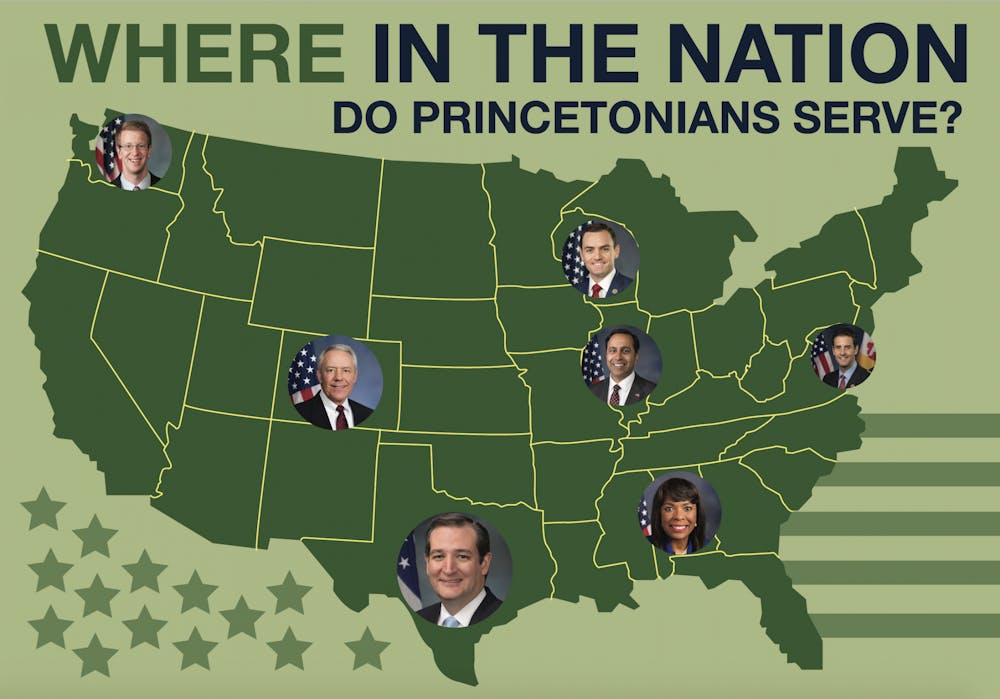The Daily Princetonian spoke to members of Congress who are University alums, and asked them how they believe they work “in the Nation’s Service.”
Ted Cruz ’92
Cruz currently serves as the junior senator from Texas. He honed his academic and political skills during his time at the University.
As a student at the University, Cruz spent much of his time on the debate panel and in student government.
“The Princeton debate panel had a profoundly positive impact on my life, on the skills it takes to succeed in the practice of law, in the world of politics, and in life,” he said.
One important skill Cruz said he learned was how to interact with people who he disagreed with.
“Indeed, one of the things I encourage people today is to learn to disagree with others without being disagreeable, to engage on substance and issues and facts without getting nasty and personal,” he said.
“One of the great things that we learned through Princeton debate was how to engage on the issues with civility and respect for those with whom you disagree,” Cruz continued.

Cruz was the chairman of the Cliosophic Party in the American Whig-Cliosophic Society and the chairman of the University Council. He described his collaboration with his college and law school roommate, David Panton ’92, who was president of the Undergraduate Student Government.
“One of the issues that we both were very active leading on was continuing the tradition of ROTC at campus, that Princeton should be educating leaders across the country, but military leaders in particular,” Cruz said.
Cruz majored in the Wilson School and wrote his thesis on the ninth and 10th amendments to the Constitution. His thesis advisor was Professor Robert George, now the McCormick Professor of Jurisprudence, whom Cruz considers a friend and mentor to this day.
Cruz said he was inspired to run for Congress because of his father’s experience immigrating to the United States from Cuba. His father fought against the Batista regime and was imprisoned and tortured. His aunt later fought in the counter-revolution against Castro.

“As a child growing up, I used to sit at the feet of my dad and my Tia Sonia and listen to stories of their being freedom fighters, their fighting to be free, and it inspired me. For as long as I can remember, what I wanted to do was fight to defend our freedom,” he said.
Cruz expressed he does not take his position in the Senate for granted.

“I’ve been in the Senate seven years, and there's not a day that I don't wake up when I'm not grateful for the opportunity to be in the arena — [as] Teddy Roosevelt put it, to be able to fight for principles that matter, to be able to fight for our Constitution, and ultimately to be able to fight for liberty,” Cruz said.
“That is an enormous privilege and one that I think Princeton did a wonderful job helping equip me to participate in that arena,” he continued.
When asked about his proudest moments from his time in Congress, Cruz described a bill he introduced as part of the 2017 tax cut that supported school choice through expanding 529 college savings plans to K-12 education. After a 50/50 vote, Vice President Mike Pence broke the tie at about one in the morning.
“Education throughout the history of our country has proven to be the gateway to the American dream and, because of that legislation, it is now easier for families who are struggling to save for and provide for an excellent education for their kids,” he said.
“It may help a whole new generation of kids come to Princeton and achieve the opportunities that an excellent education can provide,” Cruz continued.
Cruz commended the University for producing future leaders.
“Producing people who are smart, who are educated, who understand history, who understand the principles that our Constitution was built upon, and who have a commitment to defend those principles — that's a legacy Princeton can be proud of,” Cruz said.
Cruz also warned about the dangers of limiting free speech on campus.
“In today's academic environment, some universities are retreating from an active engagement on substance. Some universities are moving away from free speech, away from an active dialogue. I am grateful that Princeton has resisted those efforts to silence and stifle free speech,” he said.
John Sarbanes ’84
Sarbanes is currently in his seventh term as the Representative for Maryland’s 3rd Congressional district. He got his start in politics during his time at the University.
Sarbanes majored in the Wilson School, which he said he appreciated for its focus on public policy. He was a member of the Student Volunteer Council and the Democratic Club. He also worked on the Princeton mayoral campaign of Barbara Sigmund.
“Certainly the public policy piece was there, the volunteerism piece was there, and the political opportunity to do some grassroots organizing was there as well. So I would say all of those things certainly set a good foundation for my interest in going into politics and to serve in public office,” he said.
After college, Sarbanes studied law and politics in Greece on a Fulbright Scholarship before going to Harvard Law School. He practiced law in Baltimore while working simultaneously in the public sector for the Maryland State Department of Education. Sarbanes was also the President of the nonprofit Public Justice Center.
“So when [the opportunity to run for office] presented, I thought, rather than kind of juggling three different pursuits simultaneously, why not take a job where, frankly, all of those things intersect — public sector, private sector, nonprofit sector — in terms of the issues you're grappling with, because public policy affects all of those things,” he said.
Politics runs in the Sarbanes family, as Sarbanes’s father Paul Sarbanes ’54 served as a member of the House of Representatives and later a Senator for Maryland.
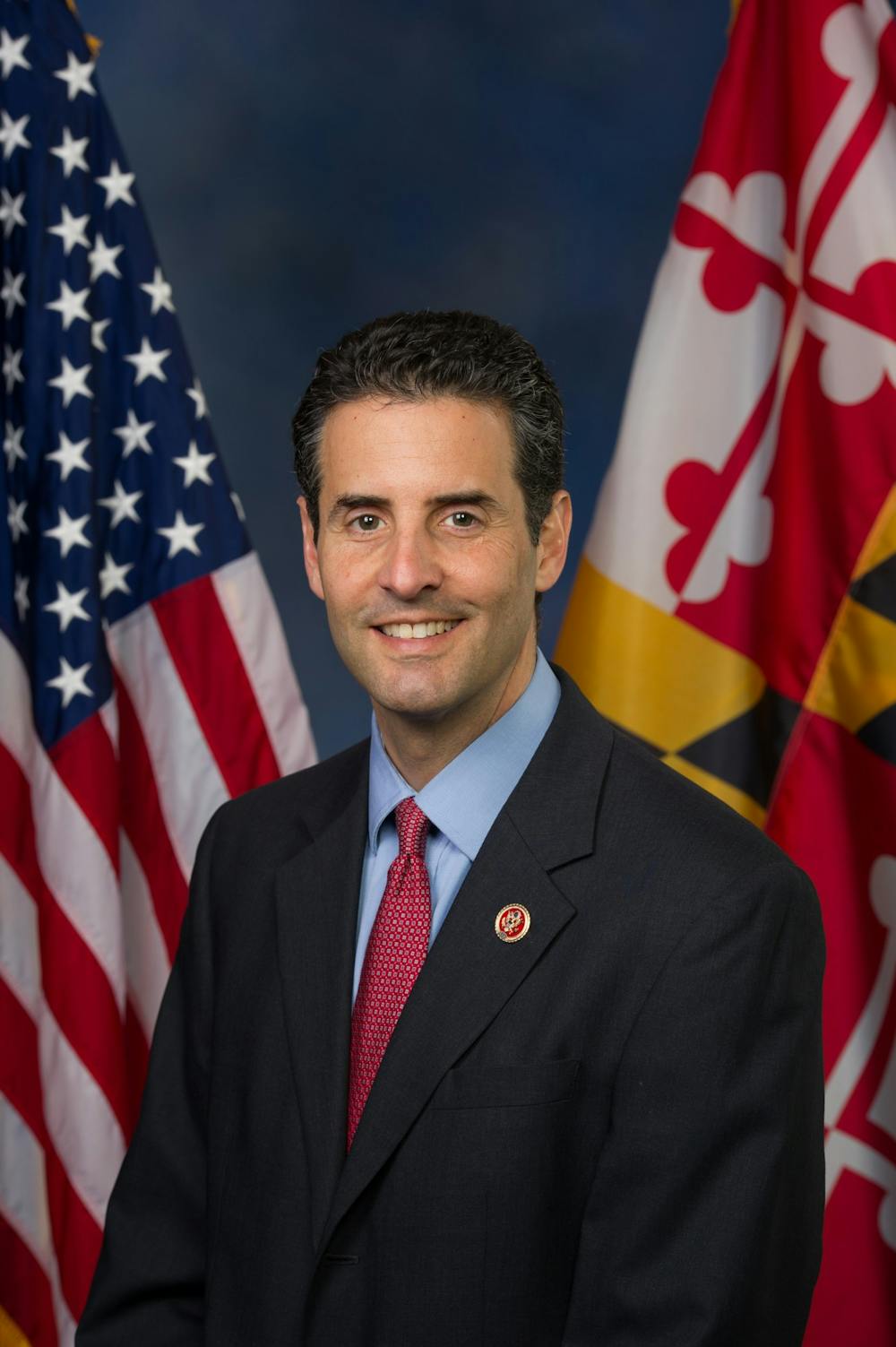
When asked about his proudest moments during his time in Congress, Sarbanes described the passage of the Affordable Care Act. He serves on the Health Subcommittee in which the hearings on the ACA took place.
“I would imagine, however long I serve in Congress, I will always view that as being at the top of the list or near the top of the list in terms of accomplishments,” he said.
Sarbanes also highlighted his work on the No Child Left Inside Act and the Public Service Loan Forgiveness Program. Now, Sarbanes considers democracy reform to be his number one priority. As Democracy Reform Task Force Chair, he wrote H.R. 1, the For the People Act.
“I was privileged to be given the assignment by the Speaker to assemble these terrific ideas and proposals for how to address impediments to voting, how to make sure we draw our district lines in a way that's respectful of our constituents — more transparency when it comes to ethics and accountability by lawmakers in Washington and certainly by the executive branch,” he said.
“We got that introduced as H.R. 1, the first bill introduced by Democrats after eight years of being in the minority, and we were able to get it passed within the first hundred days on March 8, and we’re going to keep pushing so that ultimately those reforms will become law and hopefully begin to restore people's confidence in their democracy,” Sarbanes continued.
Sarbanes believes that “Princeton in the nation’s service” applies to alumni, no matter what career field they enter after graduating from the University.
“I think what that means is just understanding that even as students understandably are pursuing education that can allow them to have a rewarding and in many cases profitable career, that it's important always to weave into your life and your career and your commitment this willingness to give back to your community,” he said.
He commended the University for teaching its students the value of service.
“I don't think any institution should just assume that the students who matriculate, they're going to gravitate towards those opportunities,” Sarbanes said.
“You need to create a culture and an expectation that people will serve, give back, volunteer, strengthen their community. I think Princeton tries to do that through that commitment, and I think the motto represents that commitment,” he continued.
Ken Buck ’81
Buck has spent three terms as the Representative for Colorado’s 4th congressional district as a Republican. The University inspired him to follow his dreams.
“The most important lesson I learned at Princeton was that there is no ceiling. I was surrounded by other young people who excelled in a variety of areas and just learned an important lesson that I could achieve what I set my mind to,” Buck said.
“The education was important, the inspiration was important, but the knowledge that there is no upward limit given energy and enthusiasm was the most important thing I learned,” he continued.
Buck majored in politics during his time at the University. As a student, he was involved in the Reagan campaign.
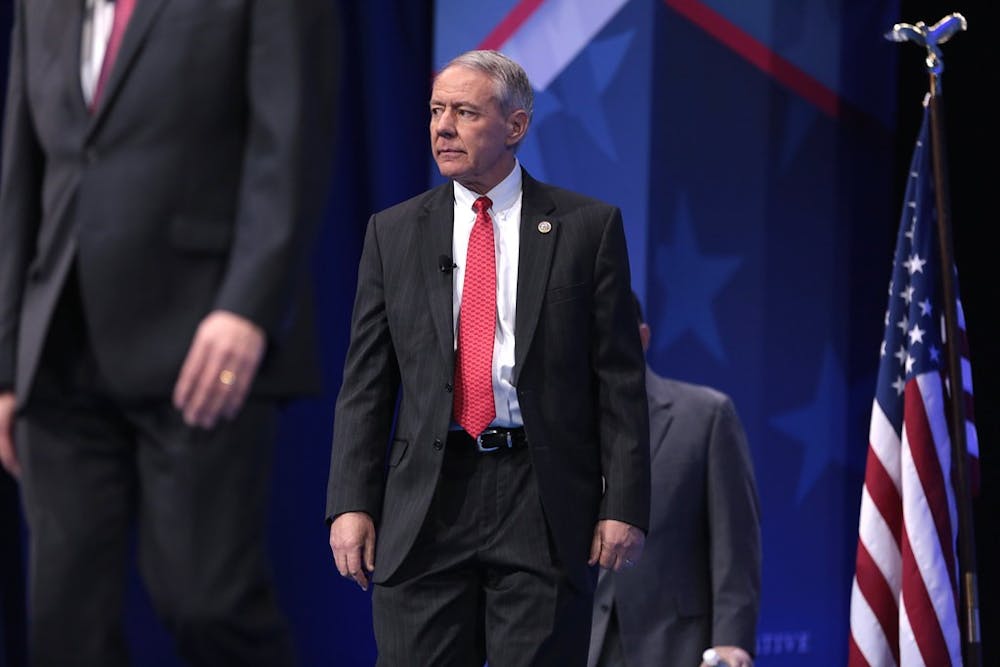
Before running for Congress, Buck was the Chief of the Criminal Division for the Colorado U.S. Attorney’s Office. He was elected three times to the position of Weld County District Attorney. These experiences in law enforcement motivated him to run for Congress.
“I spent 25 years in law enforcement and grew increasingly frustrated with the lawmaking process, and the lack of experience from a number of the lawmakers concerning the criminal justice system, and, really, the boundaries that we have in society, and decided that I wanted to shift from law enforcement to lawmaking,” Buck said.
Buck said he appreciates the chance to directly help his constituents, especially those who want to join the military.
“The most enjoyable part of my job, and one of the things that makes me the proudest of my job, is to nominate young people to military academies and see our best and brightest to go on to serve their country,” he said.
Princeton’s motto of “in the nation’s service” reminds Buck of the importance of giving back to the community.
“It means that that there is something greater than self-interest in career,” he said. “It means that helping others and serving the greatest country in the history of the world is important and should be part of every person’s career at some point.”
“I think that we, as Princeton students, are blessed with a great education and great opportunity, and paying that back by serving our country is a noble way to proceed, a noble way to live life,” he continued.
Buck appreciates the University’s continued dedication to service.
“I have a Princeton student intern in my office every year,” he said. “I'm really very happy to see that the university has continued to stress that.”
Terri Sewell ’86
Sewell represents her hometown of Selma as the Representative for Alabama’s 7th Congressional District. She credits the University with helping her achieve her dream of becoming an elected representative.
“While my foundation in public service comes from home, Princeton was able to hone my intellectual skills, as well as provide me with resources and opportunities to propel me into an opportunity as big as being a member of Congress,” she said.
Sewell’s thesis for the Wilson School was called “Black Women in Politics: Our Time Has Come.” For her research, she traveled around the country interviewing black women in politics, including current California Senator Maxine Waters, who was an assemblywoman at the time. Sewell’s own mother was the first black woman on the Selma City Council.
“Watching her run for office and watching the dynamics in our own family, of having a mother be the one who has a public face, was very inspiring to me,” she said.
“I never thought growing up that I couldn’t be a woman in elected office. I never thought that I couldn't succeed in a world that didn't look like me and didn't expect a person from my zip code to succeed, and I owe all of that to the people back home,” she continued.
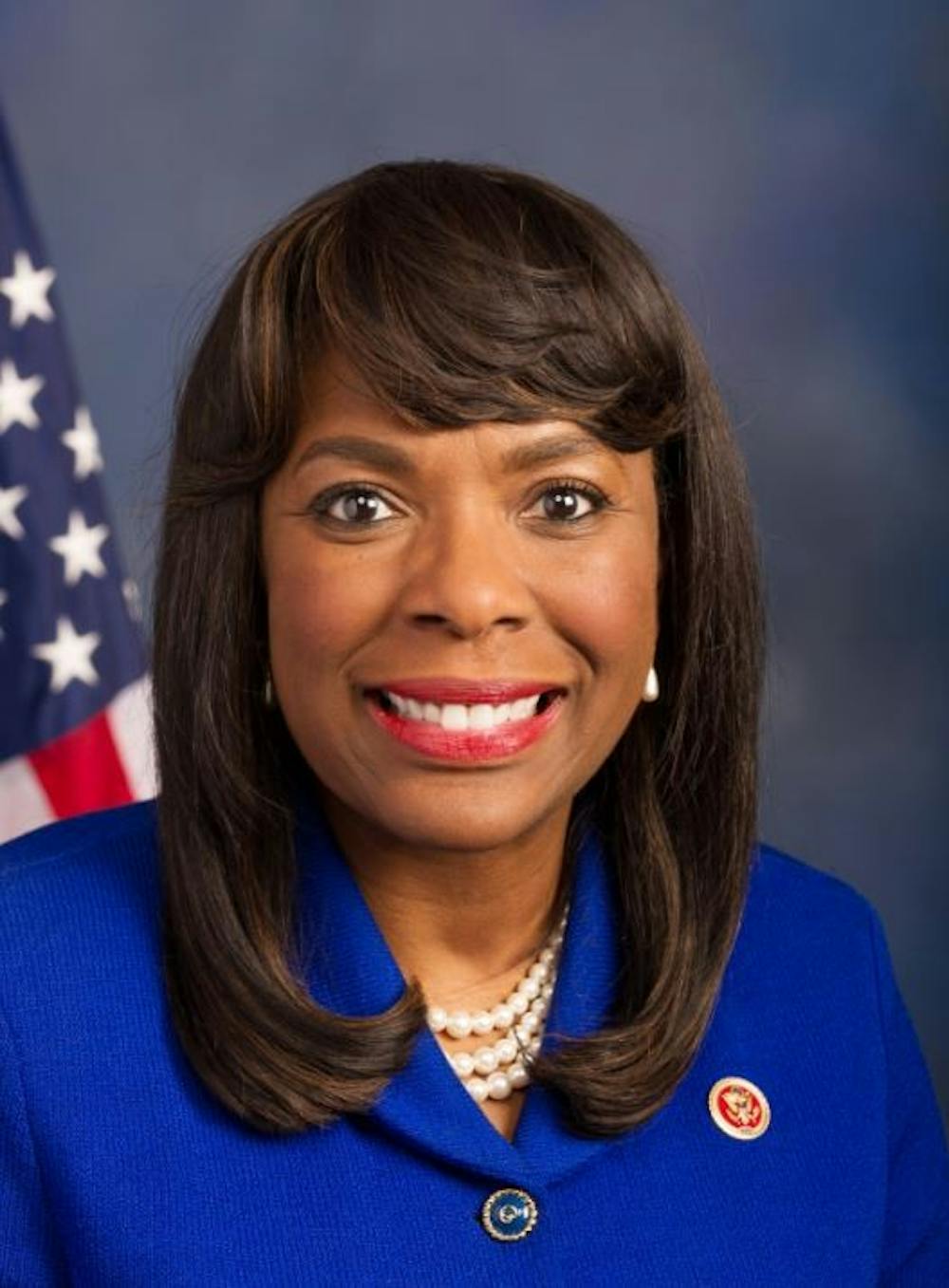
Sewell is now in her fifth term in Congress and hopes to be elected to her sixth term in 2020. When she was elected in 2010, she became the first African-American woman to represent Alabama in Congress.
“It is humbling to have that title, but I know it’s not about me. It really is a testament to the fortitude, to the resilience, to the brilliance, to the bravery of those who came before me,” she said.
Her friends and classmates from Princeton supported and believed in her during her election campaign.
“It was really Princeton folks that really, really believed in me and believed I would be not only a great representative from Alabama, but saw the potential that I could also represent them nationally,” she said.
When Sewell interned for her representative in Congress during her time at the University, her district was the poorest in the state with the highest unemployment rate and highest dropout rate. When she was elected to represent her district 28 years later, her district still held that status.
“The challenge for me was to see how I could provide better resources and opportunities to folks back home,” Sewell said.
“After all, I represented what was possible from that district with opportunities given to me by being able to get into great universities like Princeton, Oxford, and Harvard Law School, but also reinforced by a wonderful community that told me I could be somebody and I believed them,” she continued.
When asked about her proudest moment in Congress, Sewell described her first piece of legislation that passed both houses, which was, in 2013, on the 50th anniversary of the 16th Street church bombing that killed four black girls in Birmingham, Ala.
“To be that representative during the 50th year anniversary and to be able to pass a bill to give a Congressional Gold Medal posthumously to those four little girls, and one set of parents were still alive, to witness that bill being signed into law in the Oval Office by Barack Obama, the first African-American president, was a pinch-me moment,” she said.
She also described another pinch me moment during the 50th anniversary of the march from Selma to Montgomery.
“It was an amazing experience that I will never ever forget, aside from the fact that the President spoke an amazing speech about how far this nation has come,” she said. “But to really be an embodiment of that progress was both humbling but also a huge responsibility.”
Sewell hopes that Princeton students will take the opportunities and resources given to them by Princeton and use them to help others.
“A place like that that provides people with such a world-class education, that is an education that not only is informed by books, but by people and by places and opportunity,” she said.
“I think that that opportunity coupled with the resources that Princeton provided places a huge responsibility on those of us who get that opportunity to do more than just provide for our own economic security, but that we must look outward and provide opportunities for others,” she explained. “That’s an important mission that Princeton … inculcates in all of us.”
Mike Gallagher ’06
Gallagher currently serves as the Representative for Wisconsin’s 8th congressional district. A Republican and first-term congressman, Gallagher got his start in the Wilson School.
Gallagher first became interested in the Middle East after he got assigned a project studying terrorist targeting methods during his time working at a British think tank. After his internship, he pursued a certificate in Near Eastern studies and started studying Arabic.
“That's kind of what led me to start thinking about how I could serve my country and use those language and regional skills in a very real way and try and live out the motto of ‘Princeton in the nation’s service,’” he said.
Gallagher enlisted in the Marine Corps right after college. He completed Officer Candidate School the summer after his junior year and then got commissioned when he graduated.
“I was lucky to go to Princeton and I felt that I had a debt that I needed to repay and the military was one way I could pay off that debt,” he said.
“Then on a practical level, I just thought it would be a fun challenge. I thought it would really test me not only academically, mentally, physically, but also just in terms of leadership,” he continued.
Gallagher believes the military should reflect the diversity of America.
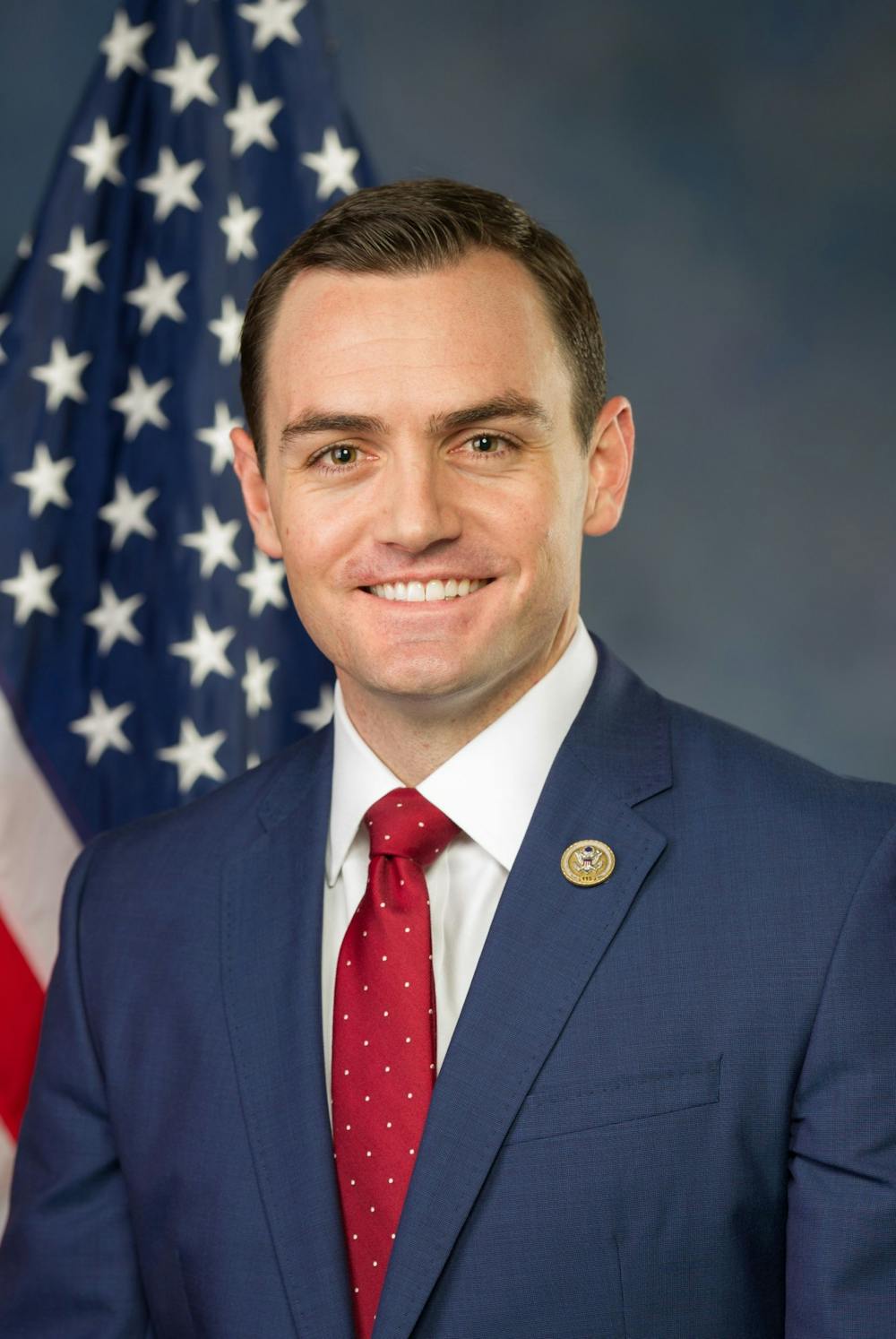
“I think the strength of our military isn't ultimately in the weapons we carry, or the ships, you know, the airplanes we buy,” he said. “It’s in the individual soldiers, sailors, airmen, and Marines, it’s in their warrior ethos and their fighting spirit and the extent to which they reflect American values.”
Gallagher used the GI Bill to pursue a Ph.D. He first got elected to Congress in 2016 and currently serves on the Transportation and Infrastructure, Homeland Security, and Armed Services Committees.
“The opportunity to serve on the Armed Services Committee and shape higher level military policy after serving is a true honor,” he said.
He also appreciates the chance to directly assist his constituents.
“I think my most rewarding moments are just when I’m back in the district and my team has helped one of my constituents get the VA benefits that they need or navigate their social security benefits or help resolve an immigration case or someone’s spouse trying to come to the country, all the little ways in this job that you can help people,” he said.
“It's truly gratifying when people come up to you back home and say ‘thank you’ for that,” he continued.
Along with Raja Krishnamoorthi ’95, Gallagher co-founded the Middle Class Jobs Caucus.
“Obviously, he’s a Democrat, I’m a Republican, and we come at this from different perspectives, but we both agree that there’s a phenomenon we’re studying here, which is to say the middle class is hollowing out,” he explained. “So we formed the caucus to examine that, why it's happening, and ultimately come up with policies that we could introduce in a bipartisan way to help strengthen the middle class.”
Gallagher, like the other congresspeople interviewed, finds enduring meaning in the University’s motto of “Princeton in the nation’s service.”
“I think it means that not just as Princetonians, but as citizens, we all have a responsibility to leave the country a little bit better than how we found it. If we can do that, then we can continue to be really a source of hope for the rest of the world and the leader of the free world,” he said.
Raja Krishnamoorthi ’95
Krishnamoorthi serves as the representative of Illinois’s 8th Congressional District. At the University, he majored in Mechanical Engineering and received a certificate from the Wilson School.
According to Krishnamoorthi, both of his undergraduate areas of study helped prepare him for his work in Congress.
“My study of engineering helped to hone my analytical skills, which are useful in any endeavor,” he said. “My public policy degree helped to add to my understanding substantively of, you know, different issues of public policy that I encounter even today in Congress.”
Krishnamoorthi immigrated to America from New Delhi, with his parents, as an infant. His trajectory since then is what inspired him to run for office.
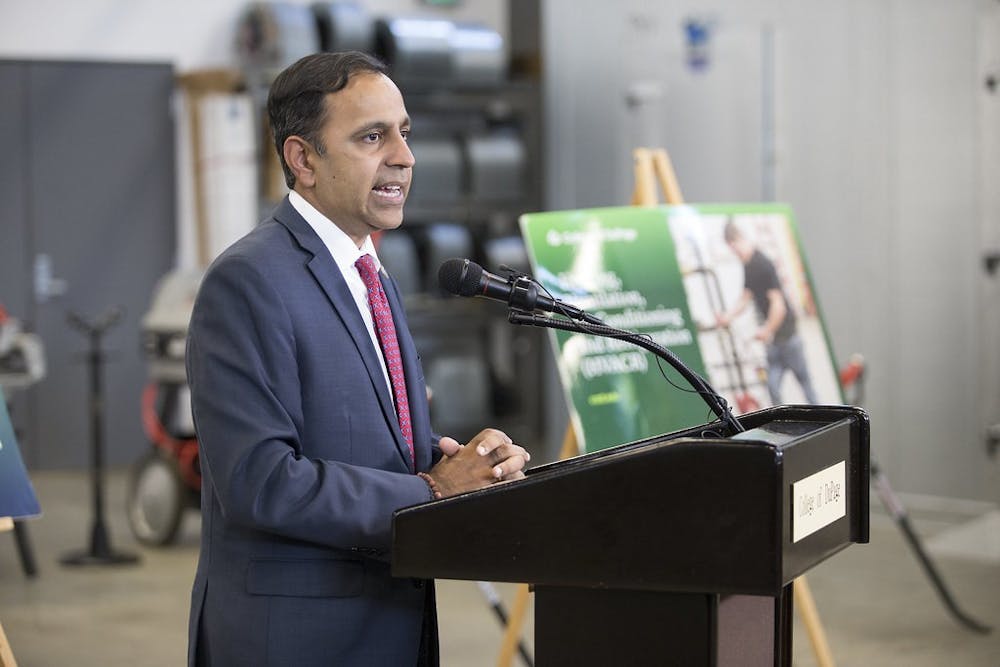
“I came to this country when I was three months old. And you know, pretty much this country's afforded my family and me incredible opportunities that I never my parents and I never would have dreamed of,” he said. “And so now I have a chance to give back in a significant way and, you know, make sure that others have the same opportunities.”
When asked about the proudest moments of his career in Congress, Krishnamoorthi said it was the passing of the reauthorization of the Carl D. Perkins Career and Technical Education Act.
“Passage of the reauthorization of the Perkins career technical education act is probably my proudest legislative moment,” he said. “You know, 13 million people are getting a higher quality skills based education starting this July, and this is incredibly important for making sure, you know, more families can enter the middle class and stay in the middle class.”
Another one of Krishnamoorthi’s proudest moments involved advocating on behalf of Muslim-American green card holders during Trump’s Muslim Ban.
“I was the first member of Congress to go to O'Hare International Airport in Illinois and help free a couple dozen, you know, Muslim-American green card holders who had been stopped from re-entering the country because of Muslim Ban 1.0,” he said. “I fought tooth and nail against any kind of action or practice from the Trump administration that's discriminatory in nature against anybody.”
Krishnamoorthi connects to the University’s motto “In the Nation’s Service” on two levels.
“I think what it means to me is Princeton, doing two things, one, training — educating and training the next generation of individuals who will help take our country forward, whether it's in the fields of science, or engineering, or public service, or any number of endeavors,” he said. “Then secondly, the University itself, helping to create the next generation of research and pushing the frontiers of our understanding in so many different fields, and making sure that our country remains, you know, technologically adept and making sure that we push the frontiers of understanding and progress in so many different areas.”
Derek Kilmer ’96
Kilmer grew up in a timber town on the coast of Washington State, in an area where he now serves as the representative from Washington’s 6th Congressional District. Kilmer links his passion for public service to his time at the University.
“I really appreciated the service ethic of Princeton,” he said. “The notion of service is something that, I think becomes part of your DNA when you graduate [from] Princeton, and even before I chose to run for office, I was trying to find opportunities to be involved in my community and making a difference on issues that matter to folks in my region.”
Growing up in Washington, Kilmer witnessed many people lose their jobs due to the struggles of the timber industry. He was attracted to the University because of the Wilson School and the possibility of making an impact on people’s lives through public policy.
“One of the biggest impacts that Princeton had for me was that it enabled me to research something that I really cared about,” he said. “My senior thesis at Princeton was literally ‘How do you help timber towns in Washington State?’”
When he decided to run for office, Kilmer returned to his hometown in Washington. He was troubled by the state of the discourse between the forestry industry and the conservationist community.
“One of the things that I was concerned about was that the dialogue between the timber industry and the conservation community had not really advanced in a positive way,” he said. “Honestly, it wasn't working for anybody. I would argue, you know, the status quo wasn't working for forest health, for environmental health, and it certainly wasn't working for the health of our community, economically.”
In response to this problem, Kilmer founded the Olympic Forest Collaborative, a forum for discussion between the timber industry and the conservationist community. He prides himself on the strong communication he has fostered between the two groups.
“We've had multiple projects that have advanced,” he said. “We increase the harvest levels in our region, for the forest, and we've avoided litigation because it's been done in a way that the environmental community has been part of the conversation.”
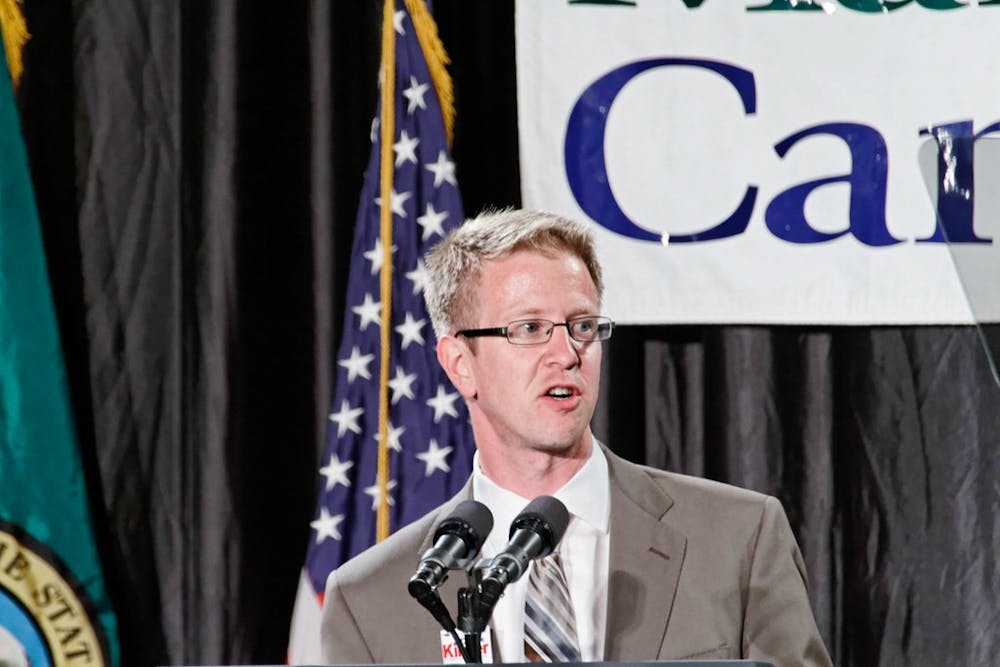
As Chair of the Select Committee on the Modernization of Congress, a committee dedicated to assessing Congress’s progress and recommending changes, Kilmer has tried to foster a similar culture of civility. He credits the committee’s successful passing of 29 unanimous recommendations to its members’ bipartisan cooperation.
“Oftentimes when you start a committee, the first thing that happens is the committee gets its budget,” he said. “And you take the budget and divide it by two, and the Democrats get their money, and they hire people with a Democratic background who put on blue jerseys. And Republicans get their half of the money and they hire people who put on red jerseys.”
Under Kilmer’s leadership, the committee diverged from this practice and hired one group of experts. Members of the committee have worked together to try to improve Congress.
Kilmer also works on advancing affordable education, fighting climate change and discrimination, and promoting veteran rights. One of the proudest moments of his career involved advocating on behalf of a veteran.
“We had a guy reach out to our office who fought in the Vietnam War. He’d gotten injured on a mission and never got his Purple Heart,” he said. “He had reached out to our office and said, ‘you know, it would help me heal some of the wounds that people cannot see, if I can get that Purple Heart.’”
Kilmer and his staff helped advocate for the declassification of the mission on which this veteran was injured in order to allow him to receive the Purple Heart award.
“One of the coolest days I've had in this job was getting to pin that Purple Heart to his chest,” Kilmer said.
Kilmer also takes deep pride in the success of his staff. He appreciates playing a role in hiring young people who want to work in politics.
“We have a really good team of a really good, diverse group of people who are all doing this because they want to serve our country, and they want to make a difference on behalf of the American people,” he said. “I hope that Princeton students, even as we are in this very divided time, recognize the value of public service as a means to have an impact and to make people's lives better.”
Kilmer serves on the University’s Board of Trustees. He has served on the Student Life Committee, the Honorary Degrees Committee, and the Public Affairs Committee; and he currently serves on the Academic Affairs Committee and the Alumni Affairs Committee.





